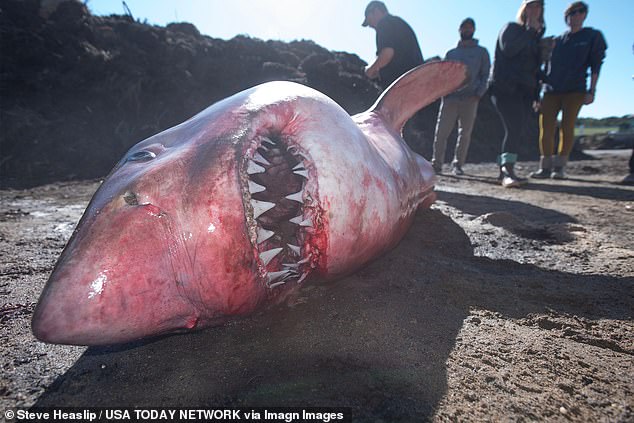
Mysterious Strandings of Giant-Brained Great White Sharks Along Atlantic Coast
Mystery as Giant-Brained Great White Sharks Wash Up on Atlantic Beaches
(Image: A dead great white shark on Nauset Beach, Massachusetts, October 2024)
Scientists are alarmed by a baffling trend: increasing numbers of dead great white sharks, all with enlarged brains, are washing ashore along North America’s Atlantic coast. The mysterious cause of death—meningoencephalitis, a brain tissue inflammation that impairs cognitive function—has left experts scrambling for answers.
Unprecedented Cases
Before 2023, Canada’s wildlife experts had not recorded a single stranded great white shark in 30 years. But in August 2023, a shark washed up on Prince Edward Island with no injuries. Autopsies revealed brain inflammation. Since then, four more sharks have been found on Canada’s Atlantic coast, and similar cases were reported in the U.S. as early as July 2022 off Massachusetts.
Dr. Megan Jones, a veterinary pathologist with the Canadian Wildlife Health Cooperative, highlighted the anomaly: "Three of these five sharks had the same brain disease. We need to determine if this is a new pathogen threatening the species." The inflammation could disorient sharks, leading to beaching or starvation.
Possible Causes
While bacterial infections have caused brain swelling in sharks before, this pattern suggests an unknown trigger. Some experts, like Tonya Wimmer of the Marine Animal Response Society, speculate rising shark populations—due to climate-driven migration northward and rebounding seal numbers (their primary prey)—could explain more frequent strandings.
Climate and Human Impacts
Warmer Atlantic waters have pushed sharks into new habitats, while seal population recovery provides abundant food. However, human activities remain a critical threat. Commercial fisheries often accidentally catch sharks, exacerbating their vulnerable status. Globally, only 3,500–5,000 great whites remain.
(Image: Scientist examines a shark’s brain tissue showing inflammation)
Misunderstood Predators
Despite their fierce reputation fueled by films like Jaws, great whites rarely attack humans. Instead, they face existential threats from overfishing and habitat disruption. Research on sharks lags behind other marine life, leaving gaps in understanding their health and behavior.
Call for Action
The unexplained deaths underscore the urgency for funding shark studies. “We know so little about their biology,” said Dr. Jones. “Solving this could prevent further losses of a crucial ocean predator.”
Scientists urge beachgoers to report stranded sharks and support conservation efforts to protect these misunderstood giants.
Image credits: Canadian Wildlife Health Cooperative, Marine Animal Response Society
Word count: ~600
Key elements retained: Mystery, case details, expert quotes, climate/human impacts, conservation call.
Images suggested: Two placeholder references aligning with critical points (stranding cause and research process).


